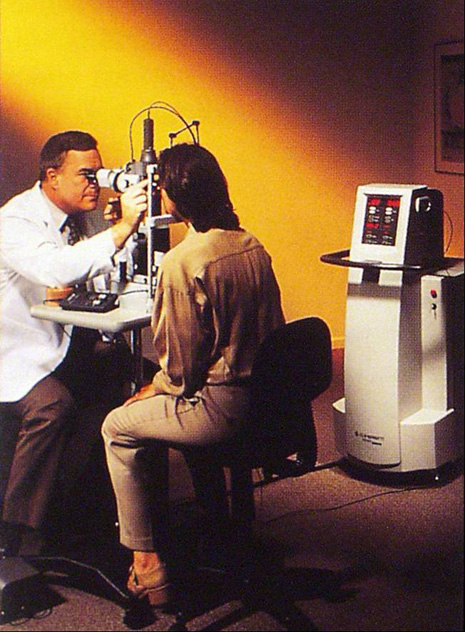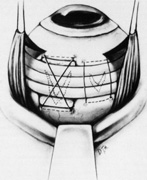 Retinal Detachment
Retinal Detachment

 Retinal Detachment
Retinal Detachment

Retinal detachment is a condition in which the
innermost layer of the eye called the neurosensory retina detaches from its
underlying layer with the accumulation of fluid underneath.
1. Who can get
Retinal detachment?
Myopic patients, Aphakic patients (patients with no intraocular lens following
cataract surgery), Trauma, Diabetes are among some of the leading causes for
Retinal detachment.
2. What are the symptoms of Retinal detachment?
Symptoms suggestive of Retinal detachment are Flashes, Floaters, Fall in vision
like a curtain from one side, Diminision of vision. However decreased vision
occurs only after some time following retinal detachment and indicates poorer
prognosis. Hence it is essential to get oneself examined if they see a cobweb
like pattern, or mosquito like objects flying around in their field of vision,
or even flashes of light appearing spontaneously.
3. Is Retinal Detachment an emergency?
Yes, a fresh Retinal detachment with recent onset of symptoms is an emergency
and the visual outcome is related to the timing of surgery among other factors.
4. What kind of treatments are available for preventing retinal detachment?


Predisposing lesions can be treated with either cryotherapy or with the latest
laser photocoagulation which causes little discomfort as compared to cryotherapy
which may be painful at times .
At Sri Venkateshwara Nethralaya, we have excellent facilities to prevent Retinal
detachment and treat its predisposing lesions including IRIDEX GREEN LASER, SLIT
LAMP DELIVERY AND LASER DELIVERY, ETC.
5.
What are the types of surgeries available for Retinal Detachment?




Once Retinal Detachment has occurred there are 3 main treatment methods namely
Pneumatic retinopexy, Scleral buckling, and vitreo retinal surgery, the choice
of a particular treatment method is determined by the nature of the disease.
At Sri Venkateshwara Nethralaya, we have all the facilities specifically
designed to treat this condition.
Our Vitreoretinal surgeon Dr K.Saravana has qualified from the prestigious All
India Institute of Medical Sciences, New Delhi, and having done his fellowship
and Senior Residency under the Universally acclaimed Retinal expert Professor Dr
H.K. Tewari(AIIMS,NEW DELHI) and is proficient in managing all types of
complicated retinal DETACHMENTS. .
6. Will I recover my vision following surgery?
Visual recovery is related to 1)duration between the onset of the Retinal
Detachment and the surgical intervention 2) Nature of the Retinal detachment 3)
associated complications 4)Anatomic success of the procedure.
Visual recovery ranges from 10%-90% and is highly case specific.
7. What are the potential complications of surgery?
Corneal decompensation, Glaucoma, Cataract, Failure to anatomically reattach the
retina , optic atrophy etc are some of the vision threatening complications of
surgery that have been frequently reported.
Other minor complications include inadequate gas fill, silicon oil reaction,
uveitis etc which can be well controlled with post operative medications.
8. What do I need to do to protect my other eye?

Careful examination of the retina for any weak areas which may require treatment
in the form of laser delimitation must be performed once every 6 months or more
frequently if required in order to prevent a Retinal detachment. However if one
notices symptoms like flashes and floaters, an immediate dilated fundus
examination is warranted.